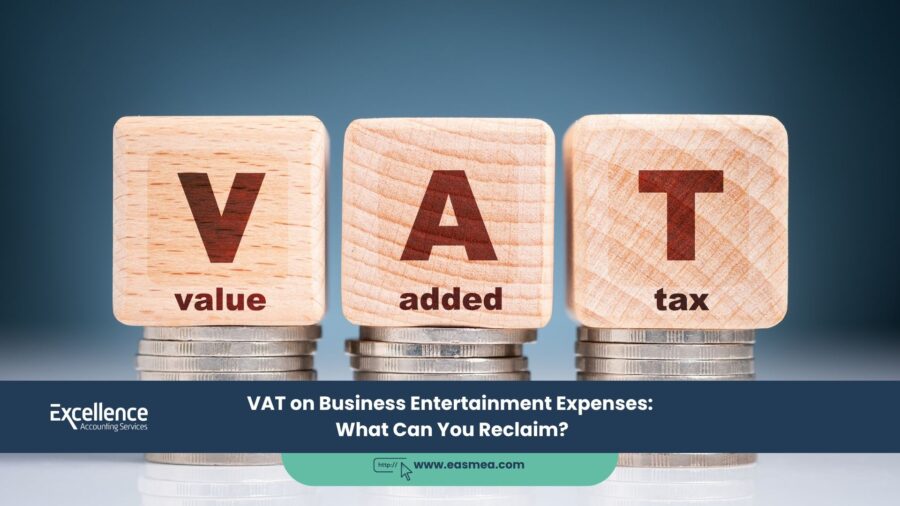VAT on Business Entertainment Expenses: What Can You Reclaim?
In the world of business, building relationships is key. A client lunch, a staff appreciation dinner, or a corporate golf day are often considered essential costs of doing business. When the bill arrives, it includes a 5% VAT charge. The natural assumption for many business owners is that since this is a legitimate business expense, the VAT paid should be recoverable. Unfortunately, under the UAE VAT Law, this is one of the most complex and misunderstood areas of input tax recovery.
- VAT on Business Entertainment Expenses: What Can You Reclaim?
- What Does the FTA Consider "Entertainment"?
- The Critical Distinction: Employees vs. Non-Employees
- Expert VAT Advisory with Excellence Accounting Services (EAS)
- Frequently Asked Questions (FAQs)
- Confused About Entertainment VAT? You're Not Alone.
The Federal Tax Authority (FTA) has specific and restrictive rules regarding VAT on entertainment expenses. The general rule is that this VAT is **not recoverable**. However, there are crucial exceptions and nuances that can make the difference between a recoverable cost and a sunk cost. Misinterpreting these rules can lead to incorrect VAT return filings and potential penalties during a tax audit.
This guide provides a definitive overview of the rules for reclaiming VAT on business entertainment expenses in the UAE. We will clarify what constitutes “entertainment,” explain the critical distinction between entertaining employees and non-employees, and provide practical examples to help you navigate this tricky compliance area. With expert guidance from VAT consultants, you can ensure you are claiming everything you are entitled to—and nothing you are not.
Key Takeaways
- The General Rule: Non-Recoverable. As a default, the input tax incurred on entertainment, amusement, or hospitality expenses is blocked and cannot be reclaimed.
- Who is Being Entertained Matters: The rules differ significantly for entertaining employees versus non-employees (clients, suppliers, potential customers).
- Exception for Employees: You **can** recover VAT on entertainment costs for employees if it’s for a genuine business purpose and you have a legal or contractual obligation to provide it (e.g., catering for an internal meeting, annual staff party).
- Exception for “Simple Hospitality”: You **can** recover VAT on the cost of simple hospitality for non-employees, such as tea, coffee, and dates served during a business meeting in your office. Lavish meals do not qualify.
- Clear Policy is Essential: Having a clear, documented internal policy on entertainment expenses is crucial for justifying your VAT treatment during an FTA audit.
- The “Purpose” Test is Key: The underlying purpose of the expense must be for business. VAT on entertaining your family and friends, even if they are also clients, is not recoverable.
What Does the FTA Consider “Entertainment”?
The first step is to understand the definition. The FTA defines entertainment as hospitality of any kind, including, but not limited to:
- Accommodation, food, and drinks which are not provided in the normal course of a meeting.
- Access to shows or events.
- Trips, such as pleasure or sporting trips.
This is a broad definition. A business lunch with a client, taking a supplier to a concert, or hosting a golf day for potential customers all fall squarely under this definition.
The default position of the law is clear: If the primary purpose of an expense is to provide free hospitality or entertainment, the VAT on that cost is blocked.
The Critical Distinction: Employees vs. Non-Employees
The rules for VAT recovery on entertainment are split into two distinct categories based on who is being entertained. This is the most important factor to consider.
1. Entertainment for Non-Employees (Clients, Suppliers, etc.)
This is where the rules are most restrictive. The general rule is that you **cannot** recover input tax on costs incurred to entertain anyone who is not an employee. This includes your customers, potential customers, suppliers, or other business contacts.
The Exception: “Simple Hospitality”
There is one very narrow exception. You can recover VAT on the cost of normal and incidental hospitality provided to non-employees during the course of a business meeting. The FTA’s guidance suggests this is limited to things like:
- Tea, coffee, and other refreshments.
- Dates, biscuits, or other light snacks.
Taking a client out for a fancy lunch at a restaurant does not qualify as simple hospitality. The VAT on that lunch bill is **not recoverable**.
2. Entertainment for Employees
The rules are more lenient when it comes to your own staff. You **can** recover input tax on entertainment costs for your employees if two conditions are met:
- You have a legal or contractual obligation to provide the entertainment.
- The entertainment is for a genuine business purpose.
A “contractual obligation” doesn’t necessarily mean it has to be written in every employee’s contract. A documented internal policy that creates a commitment to provide such hospitality is generally sufficient. For example:
- Catering provided for employees who are required to stay late for a meeting.
- Food and drinks provided at an annual staff appreciation party.
- Accommodation and meals for employees attending an out-of-town business conference.
However, if the entertainment is not for a genuine business purpose (e.g., the CEO takes a few favorite employees out for a celebratory dinner not open to all staff), the VAT would likely be considered non-recoverable.
Summary of Rules
| Scenario | Recipient | VAT Recoverable? | Reasoning |
|---|---|---|---|
| Business lunch with a potential client at a restaurant. | Non-Employee | No | This is entertainment for a non-employee and exceeds “simple hospitality.” |
| Serving coffee and biscuits during a client meeting in your office. | Non-Employee | Yes | This falls under the exception for simple, incidental hospitality. |
| Annual year-end party for all staff. | Employees | Yes | Considered a normal business practice to maintain staff morale, creating a contractual obligation via policy. |
| Taking a supplier to a Formula 1 race. | Non-Employee | No | This is clearly entertainment and the VAT is blocked. |
| Catered lunch for employees during a mandatory all-day training session. | Employees | Yes | There is a clear business purpose and an obligation to provide sustenance during the training. |
Expert VAT Advisory with Excellence Accounting Services (EAS)
The rules around entertainment expenses are a minefield of “what-ifs” and specific interpretations. Making the wrong call can be costly. EAS provides clear, practical advice to ensure your business remains compliant.
- VAT Policy Review and Development: We help you create a clear and defensible internal policy for entertainment expenses, which is a crucial piece of evidence for justifying your VAT recovery position.
- Transaction Analysis: Our VAT consultants can review your expense categories to help you correctly identify which costs are recoverable and which are blocked, preventing errors in your VAT returns.
- VAT Return Filing: We manage your entire VAT return filing process, ensuring that your input tax claims are accurate and fully compliant with FTA regulations.
- FTA Audit Support: In the event of a tax audit, we can represent you and defend your VAT treatment of expenses, backed by robust documentation and a deep understanding of the law.
Frequently Asked Questions (FAQs)
Even if the purpose of the lunch is 100% business, the VAT is not recoverable. The FTA considers this entertainment provided to a non-employee that goes beyond “simple hospitality.” The location (outside your office) and nature of the hospitality (a full meal) are key factors.
No. Even though the event has a clear business purpose, providing free food and drinks to attendees (who are non-employees) is considered entertainment. The VAT on the catering costs would be blocked.
This is a mixed situation. You would need to apportion the cost. The portion of the bill attributable to the employee may be recoverable (if it meets the business purpose test), but the portion attributable to the client is not. This requires detailed record-keeping.
Generally, no. Gifts are considered a form of entertainment. However, you can reclaim VAT on samples or gifts if the total value of supplies to that recipient in a 12-month period does not exceed AED 500 and they are used for business purposes.
This is not considered entertainment. The VAT on flights, hotels, and taxi fares for an employee traveling for a genuine business purpose is fully recoverable. However, if the employee takes a client out for dinner during the trip, the VAT on that specific meal would not be recoverable.
Yes. Providing simple refreshments to employees at their place of work is considered a normal business overhead, and the VAT on these costs is fully recoverable.
No. The cost of renting the booth space is a marketing expense, and the VAT is fully recoverable. However, if you offer lavish hospitality (e.g., a full bar or catered food) at your booth to attract visitors, the VAT on those specific costs would likely be blocked.
This is a key point of difference. For Corporate Tax, entertainment expenses incurred for business purposes are generally 50% deductible from your taxable income. For VAT, the input tax on these same expenses is often 100% non-recoverable. You must track them separately for each tax. A good accounting and bookkeeping system is vital.
No. The VAT treatment follows the nature of the expense, not the payment method. The key is whether the business is ultimately bearing the cost. If the company reimburses the employee, the same rules apply as if the company had paid directly.
Yes, under specific conditions. You can reclaim the input tax on free samples provided to non-employees as long as the total value of samples given to that person in a 12-month period does not exceed AED 500. If you give a client a sample worth AED 600, you cannot reclaim the VAT on that cost.
Conclusion: A Matter of Policy and Precision
Navigating the rules on entertainment VAT requires a shift in mindset. Instead of assuming all business expenses are recoverable, you must start from the position that entertainment VAT is blocked and then identify the specific exceptions that apply. The key to successful compliance is establishing a clear internal policy, maintaining meticulous records that justify each claim, and seeking professional advice when in doubt. By doing so, you can ensure your business stays on the right side of the FTA while recovering every dirham to which you are legally entitled.
Confused About Entertainment VAT? You're Not Alone.
Contact Excellence Accounting Services for a review of your expense policies and VAT recovery procedures.




